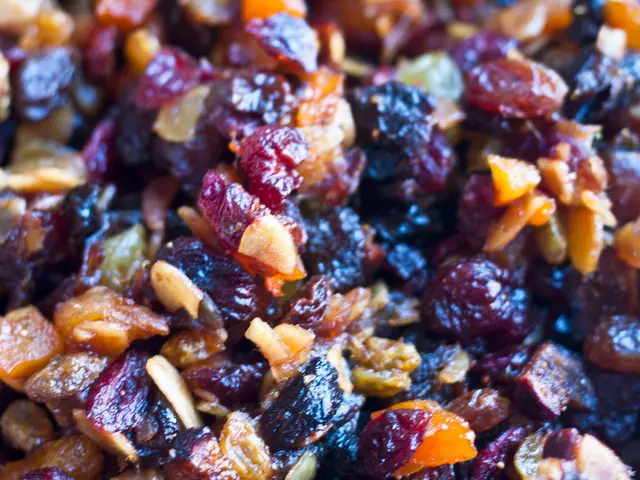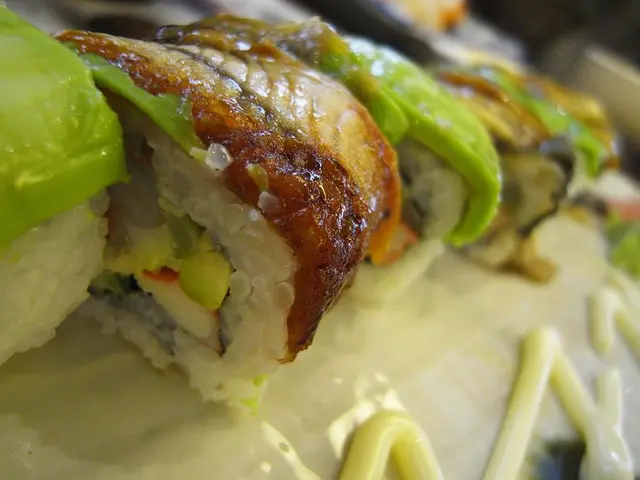Beware of Deception: Some Foods May Not Deliver the Health Benefits They Claim
Swallow this truth, folks: Just because you're noshing on organic, gluten-free grub, or living off oatmeal, salads and kale chips doesn't make you a nutrient powerhouse.
For instance, if you're snacking on gluten-free pretzels because you think they're healthier, but you don't suffer from celiac disease, you're missing out on the fiber and nutrients found in enriched flour.
"Flour is fortified with vitamins and folic acid," explains dietitian Judy Simon, R.D.N., "Gluten-free products aren't the equivalent minus the wheat." So before you dive into the gluten-free bandwagon, think about what you're really missing out on.
On the brighter side, eating healthier can save you some coin, particularly if you've been tossing your hard-earned cash on fashionable yet nutrient-poor foods. Surprisingly, many 'organic' items aren't at risk from significant pesticide residue (unlike the notorious 'Dirty Dozen'), but they may cost more, according to Simon.
It's not about the shiny green 'all-natural' label; it's what the ingredients list reveals. Here are some so-called 'healthy' foods that Simon encounters regularly in her practice.
Coconut Oil
While it's not the worst culprit by far, it's not the miracle food it's often hyped up to be either. Coconut oil boasts lauric acid, a type of fatty acid with health benefits, and it may help improve good cholesterol. Nevertheless, it's predominantly saturated fat. For cooking, it's no better than olive or avocado oil, says Simon.
Non-Dairy Milks
Rice and almond milk have minuscule amounts of protein, but they're loaded with sugar. If you're lactose intolerant, opt for unsweetened soy milk, which has just as much protein as dairy milk.
Flavored Instant Oatmeal
Instead of splurging on sugar-laden packets or cups of instant oatmeal, save your cash by buying plain oatmeal and adding your preferred toppings like fruit and honey. Even if you add your own sugar, it'll be less than what's added to flavored oatmeal.
Granola and Energy Bars
"Most of these are glorified candy bars," quips Simon. Go for bars made solely from fruits and nuts if you need a quick snack.
Restaurant Salads
Salads can be nutritious, but they can also be diet disasters if the restaurant drowns them in dressing or croutons. That kale salad you've been praising yourself for could easily contain more calories than a burger.
Fruit and Vegetable Chips
From banana chips to kale chips, there's no shortage of crunchy options when you're trying to avoid potato chips. But if the manufacturer adds extra sugar or salt, you're not much better off.
Bran and Fruit Muffins
While we appreciate the taste, these aren't ideal choices. They're bursting with sugar and hundreds of calories.
Smoothies and Green Juice
Smoothies and green juices may seem like a healthy choice, but it all comes down to how much sugar is added.
Fruit Juice
Fruit juice loses most of its fiber and some vitamins during processing. To add insult to injury, many juices contain added sugar. Instead, opt for whole fruits as much as possible, advises Simon.
Microwave Popcorn
Plain popcorn isn't inherently bad, but microwave varieties are often loaded with salt and butter. Give homemade popcorn a try instead and add a little oil or real butter for flavor.
Flavored Yogurt
The culprit here is once again added sugar. Plain or vanilla yogurt is a better choice. But stay clear of yogurt that includes a little cup of extra goodies; it's essentially dessert yogurt with a sidecar of candy to add to it.
Agave
Agave nectar (or agave syrup) is still an added sugar, explains Simon. Plus, it has more calories than regular sugar: 60 calories instead of 40 for every tablespoon.
The takeaway? Feed on whole foods as much as possible. Always check the ingredients for added sugar, salt, or fat. Making your own versions of your favorite foods—like adding flavor to plain oatmeal or baking your own fruit muffins—allows you to control how much sugar you add.
And while sugar and salt aren't intrinsically evil, Simon urges moderate consumption. Current guidelines recommend consuming less than 2,300 mg of sodium and 12 tsp of added sugar daily.
- While some believe coconut oil is a miracle food, it's predominantly saturated fat, just like olive or avocado oil, according to dietitian Judy Simon.
- Simon advises against relying on flavored instant oatmeal, as they are often sugar-laden, and suggests buying plain oatmeal and adding preferred toppings for a healthier option.
- Many non-dairy milks, like rice and almond milk, have minuscule amounts of protein but are loaded with sugar, making unsweetened soy milk a better choice for those who are lactose intolerant.
- Simon points out that many restaurant salads can be diet disasters due to excessive dressing or croutons, and suggests checking nutrition information or asking for dressings on the side to maintain a balanced meal.








